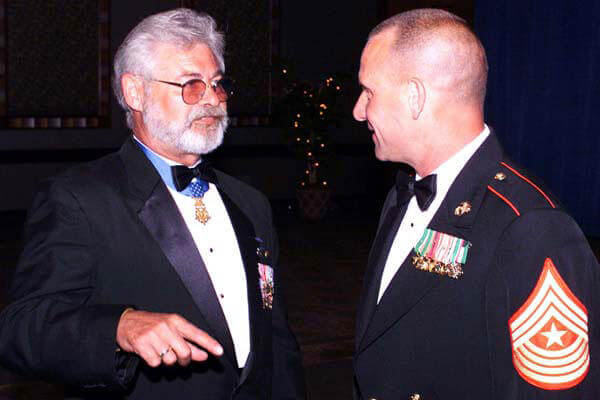A Vietnam War Medal of Honor recipient is in a different kind of fight today as he battles a blood disease that has already required chemotherapy and blood transfusions.
Retired Army Sgt. Maj. John Cavaiani, 69, needs a bone marrow transplant and family and friends are reaching out for support.
"Tons and tons of people are calling," said Debby Lemmons Fowler, Cavaiani's cousin. "He's probably had too many visitors. He's pretty worn down, I understand … but he's doing well at home considering he's taking it day by day."
Cavaiani suffers from myelodysplastic syndrome, or MDS, a disease of the blood and bone marrow once known as preleukemia. Since February, he has undergone consultations, blood transfusions and chemotherapy at the San Francisco Veterans Hospital, Hospital of the University of Pennsylvania and Sonora Regional Medical Center, Calif.
Once a marrow donor is located the procedure will be done at Stanford University Hospital. For that reason family and friends also are trying to raise $50,000 to cover the costs of living in Stanford for a little more than three months after the transfusion.
Fowler said that doctors want him to remain in the area for monitoring during that time. Though the VA and private insurance are likely to cover most if not all medical expenses, the cost of a hotel room alone there for three months will be about $17,000, she said. As of Aug. 6, supporters had raised nearly $38,000 toward the goal through the crowd funding charity website Give Forward.
Fowler said there was a noticeable spike in contributions last month during the Veterans of Foreign Wars convention in Louisville, Ky., where officials put out the word about Cavaiani's health issues.
"It's very important to get the word out there to do and blood donation," she said. "Jon is all about paying it forward. He has used so much blood [from transfusions] and he wants to make sure there is not a shortage because of that."
People interested in being screened as a marrow donor can visit BeTheMatch.org, she said.
Retired Master Sgt. Jeff Hinton said he never served with Cavaiani but knew him by reputation. Hinton operates the website Professionalsoldiers.com, which once presented Cavaiani with a Yarborough knife -- the kind of blade given to every graduate of the Green Beret Qualification Course.
"He's a great guy," said Hinton, who has been spreading the call for support via his website.
Cavaiani is something of a legend in Army Special Forces. Born in England, he moved with his family to the U.S. as a child and joined the Army shortly after becoming a citizen in 1968.
When his Special Forces platoon came under sustained attack on June 4-5, 1971, by an overwhelming enemy force, Cavaiani -- then a staff sergeant -- coordinated the defenses and made sure his soldiers got onto the evac helicopters, according to his Medal of Honor citation. But with the enemy continuing to advance, even as he ordered the last man onto the helicopter, he stayed on the ground to keep firing and keep the enemy at bay.
He was finally captured and spent the rest of the war as a POW.
He returned home in April 1973 and later was awarded the Medal of Honor by President Gerald Ford. He retired as a sergeant major in 1990.
"Jon was a very quiet, soft-spoken soldier whose humility masked his great heroism and courageous fighting spirit from many of us that served in Special Forces with him," recalled former Staff Sgt. Craig Rutherford, who served with Cavaiani in the early 1980s, B Co., 2nd Bn., 10th Special Forces Group (A) at Fort Devens, Mass.
Rutherford said Cavaiani was always the professional soldier, but also very modest. He said he had known him more than a year before he learned Cavaiani had the Medal of Honor. He learned it after they and others went out to breakfast after conducting a funeral detail. A junior communications officer noticed the MoH ribbon among the others on Cavaiani's Class As.
"When he asked Jon how he received the MoH, Jon meekly replied, ‘I was in the wrong place at the wrong time,' and nothing else was said," Rutherford explained. "He never spoke of his exploits but did quietly give guidance to his subordinates and superiors alike."
That part of his character was also revealed to Gary W. Ferrera, who also remembered Cavaiani from 10th SFG. At the time, Ferrera said he was an 18-19 year old assigned to the unit as an intelligence analyst and had not even attended the Q Course.
"He was very humble and I only actually saw him wear his MOH once, which was when he was asked to come speak to a class at a local college," Ferrera wrote. "I corrected a second lieutenant from the Intelligence School at Fort Devens for not saluting Jon when he walked past us that day as he was wearing his ribbon, and then Jon quietly corrected me for bringing attention to him -- I felt like crap after that. Lesson learned!"
Ferrera said Cavaiani set an example for him by his attention to detail and ability to put in long, arduous hours to prepare troops for deployment.





























